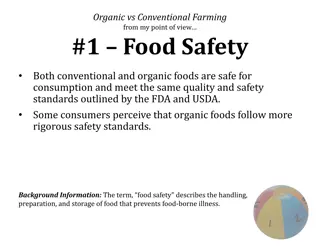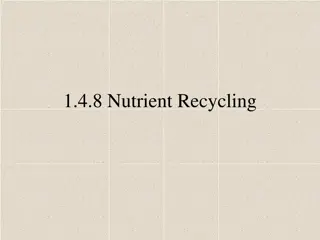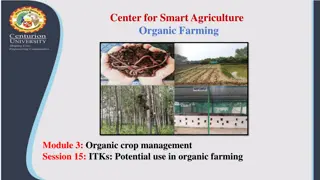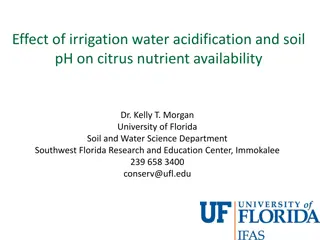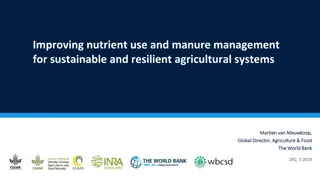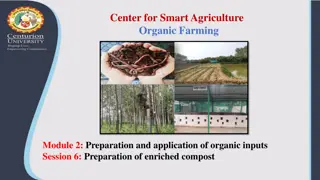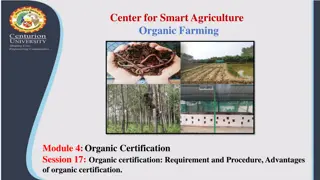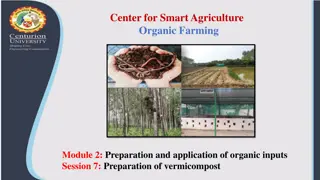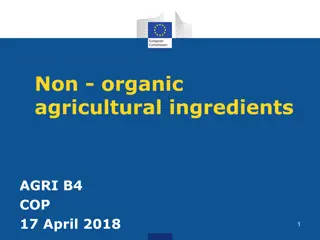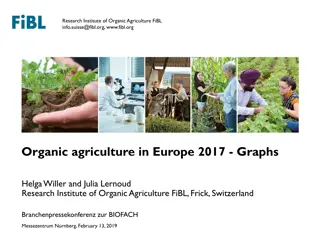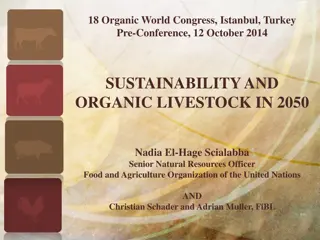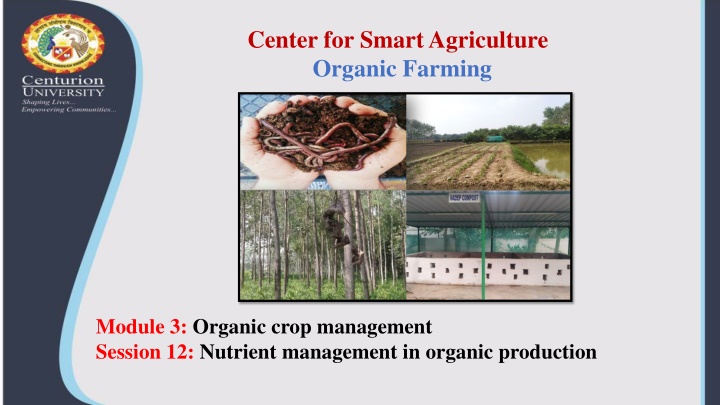
Nutrient Management in Organic Crop Production
Learn how to manage nutrients effectively in organic agriculture to enhance crop yield stability. Explore the use of organic manures, crop residues, and other tools to improve soil fertility while maintaining environmental quality. Discover the importance of organic materials and variety selection in organically managed soils for sustainable farming practices.
Download Presentation

Please find below an Image/Link to download the presentation.
The content on the website is provided AS IS for your information and personal use only. It may not be sold, licensed, or shared on other websites without obtaining consent from the author. If you encounter any issues during the download, it is possible that the publisher has removed the file from their server.
You are allowed to download the files provided on this website for personal or commercial use, subject to the condition that they are used lawfully. All files are the property of their respective owners.
The content on the website is provided AS IS for your information and personal use only. It may not be sold, licensed, or shared on other websites without obtaining consent from the author.
E N D
Presentation Transcript
Center for Smart Agriculture Organic Farming Module 3: Organic crop management Session 12: Nutrient management in organic production
Use of organic manure makes the availability of nutrients less controllable. This might result in lower yield stability. In organic systems, often a higher soil organic matter content is observed than in conventional systems. This might partly compensate for the yield limiting effect of the low nutrient availability by increasing the water bolding capacity and nutrient retention capacity of soils under organic production. In low input system such as organic farming, within field variation might affect yield stability. Most essential in the use of organic fertilizer necessity for active soil organisms, to regulate nutrient cycling processes, to make nutrients available to the crops, to make the soil structure and systems and to suppress pests and diseases.
Besides organic and composted manure, crop residue management are also fundamental tools for enhancing soil fertility. Nutrient catch crops, green manure crops, trap crops and crops with a relatively low harvest Index , like cereals , contribute to the organic matter in the soil after harvest. Integrating these tools and attuning them specific farm, site and soil will be even more important in the future with reduced availability of manure input. This is because, in the ongoing development of organic farming, the aim is to close nutrient cycles within the organic sector and to become independent of sable manure from conventional farming systems. With tightly closed nutrient cycles, nitrogen will be less of a problem than foe instance potassium and phosphorous, because nitrogen can be supplied by growing legumes that live in symbiosis with nitrogen-fixing organisms.
Organic materials such as farm yard manures, biogas slurry, compost, straw or other crop residues, green and brown manures and cover crops can substitute for inorganic fertilizers to maintain the environmental quality. The use of organic manures will increase the organic matter content of the soil increasing the water holding capacity. Erosion is reduced by organic manures. Crop rotation with legumes adds to soil fertility. Green manure provides the nutrients and improves the soil. Application of biofertilizers may be done to supply nutrients to crops as well as to increase the biological activity of the soil
Variety requirement in Organically managed soil Consequence of the above-described organic soil fertility management is that, plants have to form and maintain a larger and more active root system for nutrient uptake (have to be efficient in acquiring nutrients) and are more dependent on interaction with beneficial soil microorganisms that promote nutrient uptake. Therefore, organic farmers require varieties that are adapted to such specific low(er) input soil management and that are efficient in nutrient and water uptake under organic farming conditions that have adequate root system architecture and can interact with beneficial soil micro organisms. 1. Organic Varieties Need Adaptation to Low(er) and Organic Input Conditions 2. Organic Varieties Need Adequate Root System 3. Organic Varieties Need Large Capacity to Interact With Beneficial Soil Micro organisms
Sources of Nutrient Soil FYM Compost Biofertilizer Green manuring etc..
THANK YOU THANK YOU



